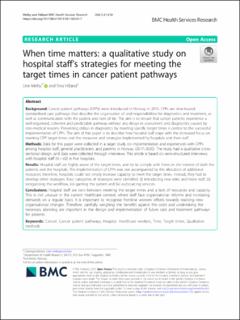| dc.contributor.author | Melby, Line | |
| dc.contributor.author | Håland, Erna | |
| dc.date.accessioned | 2022-05-31T13:38:46Z | |
| dc.date.available | 2022-05-31T13:38:46Z | |
| dc.date.created | 2021-03-10T12:38:13Z | |
| dc.date.issued | 2021 | |
| dc.identifier.citation | BMC Health Services Research. 2021, 21, 210. | en_US |
| dc.identifier.issn | 1472-6963 | |
| dc.identifier.uri | https://hdl.handle.net/11250/2997083 | |
| dc.description.abstract | Background:
Cancer patient pathways (CPPs) were introduced in Norway in 2015. CPPs are time-bound standardised care pathways that describe the organisation of and responsibilities for diagnostics and treatment, as well as communication with the patient and next of kin. The aim is to ensure that cancer patients experience a well-organised, coherent and predictable pathway without any delays in assessment and diagnostics caused by non-medical reasons. Preventing delays in diagnostics by meeting specific target times is central to the successful implementation of CPPs. The aim of this paper is to describe how hospital staff cope with the increased focus on meeting CPP target times and the measures and strategies implemented by hospitals and their staff.
Methods:
Data for this paper were collected in a larger study on implementation and experiences with CPPs among hospital staff, general practitioners, and patients in Norway (2017–2020). The study had a qualitative cross-sectional design, and data were collected through interviews. This article is based on semi-structured interviews with hospital staff (N = 60) in five hospitals.
Results:
Hospital staff are highly aware of the target times, and try to comply with them, in the interest of both the patients and the hospitals. The implementation of CPPs was not accompanied by the allocation of additional resources; therefore, hospitals could not simply increase capacity to meet the target times. Instead, they had to develop other strategies. Four categories of strategies were identified: (i) introducing new roles and more staff, (ii) reorganising the workflow, (iii) gaming the system and (iv) outsourcing services.
Conclusions:
Hospital staff are torn between meeting the target times and a lack of resources and capacity. This is not unusual in the current healthcare context, where staff face organisational reforms and increasing demands on a regular basis. It is important to recognise frontline workers’ efforts towards realising new organisational changes. Therefore, carefully weighing the benefits against the costs and undertaking the necessary planning are important in the design and implementation of future care and treatment pathways for patients. | en_US |
| dc.language.iso | eng | en_US |
| dc.publisher | BMC | en_US |
| dc.rights | Navngivelse 4.0 Internasjonal | * |
| dc.rights.uri | http://creativecommons.org/licenses/by/4.0/deed.no | * |
| dc.subject | Cancer | en_US |
| dc.subject | Cancer patient pathways | en_US |
| dc.subject | Hospital | en_US |
| dc.subject | Healthcare workers | en_US |
| dc.subject | Time | en_US |
| dc.subject | Target times | en_US |
| dc.subject | Qualitative methods | en_US |
| dc.title | When time matters: a qualitative study on hospital staff's strategies for meeting the target times in cancer patient pathways | en_US |
| dc.type | Peer reviewed | en_US |
| dc.type | Journal article | en_US |
| dc.description.version | publishedVersion | en_US |
| dc.rights.holder | © The Author(s) 2021 | en_US |
| dc.source.pagenumber | 1-12 | en_US |
| dc.source.volume | 21 | en_US |
| dc.source.journal | BMC Health Services Research | en_US |
| dc.identifier.doi | 10.1186/s12913-021-06224-7 | |
| dc.identifier.cristin | 1896968 | |
| dc.relation.project | Norges forskningsråd: 272665 | en_US |
| dc.source.articlenumber | 210 | en_US |
| cristin.ispublished | true | |
| cristin.fulltext | original | |
| cristin.qualitycode | 2 | |

